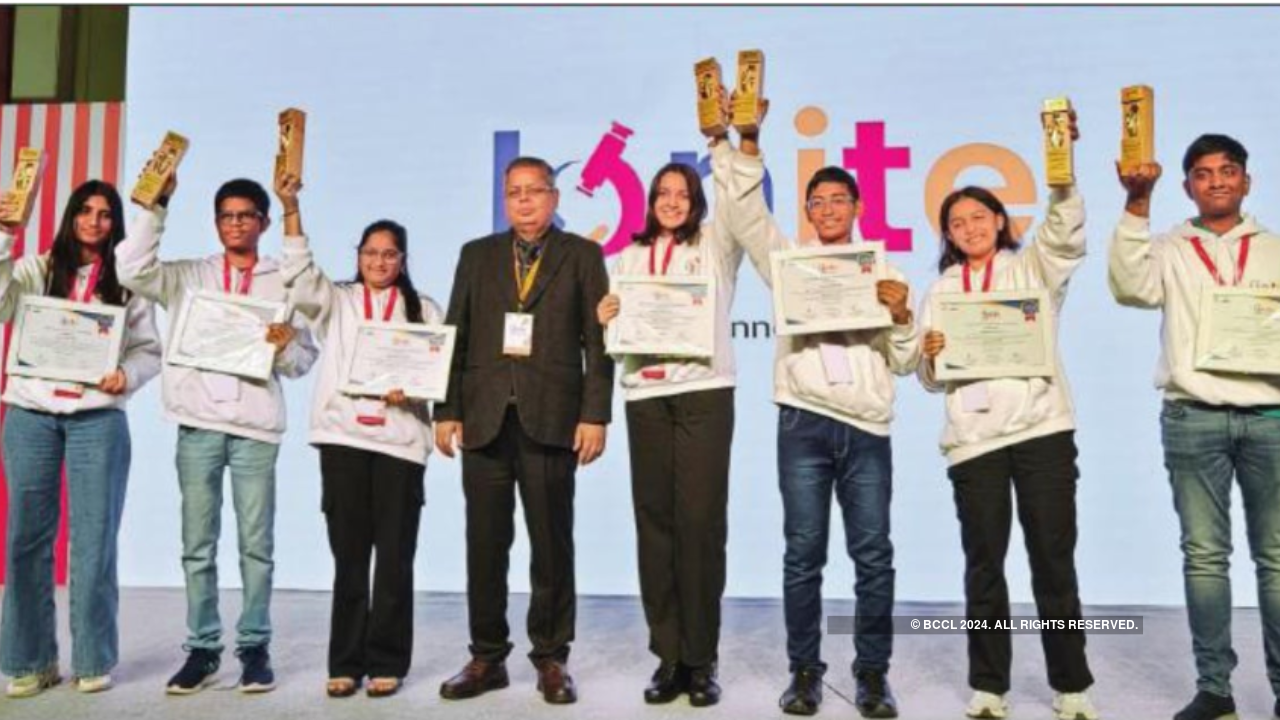➤ Vivo, in collaboration with NCERT and iHub DivyaSampark at IIT Roorkee, recently organised a national technology and innovation awards programme for students from grades 8 to 12. Seven students won awards.
➤ Vedanshi Mehta, Arushi Ganguly, and Aarav Mohanraj of AM Naik School, Mumbai, sought to transform city streets into sustainable, clean and safe urban spaces.Through the adoption of piezoelectric tiles, grass-based organic light shades, and hydraulic portals, the students worked on promoting energy efficiency, reducing carbon emissions, and enhancing road safety. They also integrated direct air capture technology for CO2 recycling.
➤ Shubhashree Sahu of Paramita Heritage School, Karimnagar, Telangana, came up with a multi-functional eco-friendly machine for use in a range of agricultural tasks. The prototype has been approved for efficiency by scientists at the Indian Institute of Rice Research. Designed to be affordable to the majority of farmers, the machine performs operations such as threshing, grain separation, straw cutting, winnowing, and bag stitching, all powered by solar energy.
➤ Shreyansh Nayak of DAV Public School, Unit-8, Bhubaneswar, designed a machine that produces bags that can help streamline and enhance the till-now labourintensive and time-consuming processes of cultivating oyster mushrooms. The machine automates key processes such as cutting straws, sterilisation, inoculation with mushroom mycelium, and packaging.
➤ Sharvi Baisiwala of Cathedral & John Connon School, Mumbai, devised a study to understand the relationship between a cyclist’s posture and performance, solving to boost the latter by optimising the former through real-time aerodynamic analysis. By leveraging a sophisticated embedded hardware system, cyclists receive instant feedback on their posture.
➤ Yash Yadav of MKH Sancheti Public School, Nagpur, developed Stemly, which endeavours to narrow the long-standing gender gap in STEM fields by intervening at scale via advanced AI pathways, in a multinodal approach certified by Yale psychologists. By targeting early biases and fostering confidence, Stemly aims to significantly enhance female engagement in STEM.
➤ Vedanshi Mehta, Arushi Ganguly, and Aarav Mohanraj of AM Naik School, Mumbai, sought to transform city streets into sustainable, clean and safe urban spaces.Through the adoption of piezoelectric tiles, grass-based organic light shades, and hydraulic portals, the students worked on promoting energy efficiency, reducing carbon emissions, and enhancing road safety. They also integrated direct air capture technology for CO2 recycling.
➤ Shubhashree Sahu of Paramita Heritage School, Karimnagar, Telangana, came up with a multi-functional eco-friendly machine for use in a range of agricultural tasks. The prototype has been approved for efficiency by scientists at the Indian Institute of Rice Research. Designed to be affordable to the majority of farmers, the machine performs operations such as threshing, grain separation, straw cutting, winnowing, and bag stitching, all powered by solar energy.
➤ Shreyansh Nayak of DAV Public School, Unit-8, Bhubaneswar, designed a machine that produces bags that can help streamline and enhance the till-now labourintensive and time-consuming processes of cultivating oyster mushrooms. The machine automates key processes such as cutting straws, sterilisation, inoculation with mushroom mycelium, and packaging.
➤ Sharvi Baisiwala of Cathedral & John Connon School, Mumbai, devised a study to understand the relationship between a cyclist’s posture and performance, solving to boost the latter by optimising the former through real-time aerodynamic analysis. By leveraging a sophisticated embedded hardware system, cyclists receive instant feedback on their posture.
➤ Yash Yadav of MKH Sancheti Public School, Nagpur, developed Stemly, which endeavours to narrow the long-standing gender gap in STEM fields by intervening at scale via advanced AI pathways, in a multinodal approach certified by Yale psychologists. By targeting early biases and fostering confidence, Stemly aims to significantly enhance female engagement in STEM.
